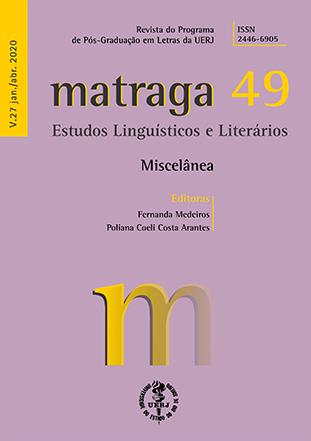Camp? Cauby! Between the concept and the enchantment
DOI:
https://doi.org/10.12957/matraga.2020.48107Keywords:
Camp, Cauby Peixoto, literary criticism, song, Performance.Abstract
In “Notes on camp” (1964), Susan Sontag brought to the academic debate the notion and the term “camp”, meaning a set of practices and values of the visual and performatic aesthetics then in vogue in New York’s gay scene. Camp culture developed in the following decades and seems to have gained new momentum in recent years, as can be seen in Met Gala 2019’s choice of “Camp in Fashion” as its theme. Camp is a hard notion to define; it is pervaded with subjective elements such as taste and with issues relating to the sociocultural roles of objects and observers. This paper draws mainly on Sontag’s essay and on Denilson Lopes’ “Third Camp Manifesto” (2002) to weave a discussion of the concept of “camp”. On the other hand, in order to explore the way camp is able to seduce its viewers, this paper examines Brazilian singer Cauby Peixoto and his performatic mannerisms, excesses and ambiguities, his privileged voice and frantic fans. Using theoretical and historical data as well as my personal experience of watching him on stage, I try to analyse Peixoto’s art and discuss whether the notion of camp is adequate to characterize it. The dilemmas and conundrums of such discussion may lead us to think over certain attitudes and functions of criticism towards its research objects: how does one deal with the wonder that problematizes and challenges academically valued aesthetic concepts without rejecting either the enchantment or the act of conceptualizing?
Downloads
Downloads
Published
How to Cite
Issue
Section
License
Authorization
Matraga – Scientific Journal of the Post-graduate Program in Arts and Humanities of UERJ is authorized to publish the article submitted here, if it is accepted for online publication. It is attested that the contribution is original, that it is not being submitted to another publisher for publication, and that this statement is the expression of truth.
The works published in Matraga's virtual space – Scientific Journal of the Post-graduate Program in Arts and Humanities of UERJ will be automatically transferred, and your copyright is reserved to Matraga. Its reproduction, in whole or in part, is conditional on the citation of the authors and the data of the publication.

Matraga uses license Creative Commons - Attribution-Non-Commercial 4.0 International.





